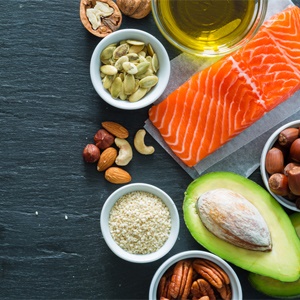
With all the attention that the very high-fat Keto diet is getting, you might be wondering how much fat is healthy and how much your body really needs every day to thrive.
First, know that some fat is essential for most people. Your body uses fat for many health functions, including processing fat-soluble vitamins like A and E. Including some fat in meals helps you feel more satisfied, and that's important when you're eating fewer calories on a weight-loss diet and want to curb between-meal hunger.
The kind of fat matters
As for ideal amounts, healthy adults should eat between 20% and 35% of their calories from fat, according to the Academy of Nutrition and Dietetics. Keep in mind that one tablespoon of olive oil is equal to 10% of the daily calories in a typical, 1 200-calorie per day weight-loss diet.
To calculate a more personal daily range of fat grams, the American Council on Exercise suggests a simple formula. For the minimum amount, multiply your weight (in pounds) by 0.4 and for the maximum, multiply it by 0.5. So, if you weigh 140 pounds (63.5kg), that's between 56 and 70 grams of fat each day.
What kinds of fats you eat matter, too. Most should be from mono- and polyunsaturated fat foods. Limit saturated fats and avoid trans fats altogether. Trans fats are being phased out of packaged foods, but you might still see items on shelves until 2020, so read ingredient labels carefully.
Main sources of key fats
- Monounsaturated fats: olive, canola, peanut, safflower and sunflower oils; avocados; peanuts and most nuts.
- Polyunsaturated fats: fatty fish such as trout, herring and salmon; walnuts; flax, pumpkin, sesame and sunflower seeds; sunflower, corn and soybean oils.
- Saturated fats: butter, lard, coconut and coconut oil, cocoa butter, palm oil and palm kernel oil; meat, poultry and full-fat dairy.
- Trans fats: typically partially hydrogenated oils found in packaged goods from non-dairy creamers to some microwave popcorn.
A 32-year Harvard study found that replacing just 5% of saturated fat calories with polyunsaturated ones delivers important health benefits. An easy switch is to replace two servings of red meat each week with a fatty fish.
Image credit: iStock




 Publications
Publications
 Partners
Partners










